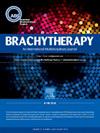Learning curve and proficiency assessment for gynecological brachytherapy amongst radiation oncology trainees in India: Results from a prospective study
IF 1.8
4区 医学
Q4 ONCOLOGY
引用次数: 0
Abstract
PURPOSE
The quality of cervical cancer intracavitary brachytherapy (ICBT) depends on the training and experience of the radiation oncologist (RO). The present study was performed to establish primary learning curve for ICBT.
MATERIALS AND METHODS
Forty-three skill parameters were identified for performing ICBT and were included for Brachytherapy Proficiency Assessment and Scoring System (Brachy-PASS) questionnaire. Brachy-PASS score was first compared with blinded objective scoring of implant quality for 10 trainees by two ROs. Twenty eight consecutive trainees were scored with Brachy-PASS by two RO's. The impact of number of procedures and training years was ascertained using Mann Whitney-U test. Minimum number of intracavitary procedures to attain proficiency (score 75%) were ascertained and learning curve plot of proficiency and procedures was generated.
RESULTS
Between January, 2022 to September, 2023 38 trainees were evaluated (20: post graduate year (PGY) 1-3, and 18: PGY 4-5) after due consent for skill evaluation. Good congruence was reported of objective scoring and Brachy-PASS (83.4% vs 88%). Ten trainees had performed <15 ICBT, and 28 had performed ≥15 ICBT procedures. Overall 30/38 trainees (78.9%) achieved a Brachy-PASS score of ≥129 (75%). The average score for trainees with <15 procedures was 126.6 (73.6%) vs 148.8 (86.5%) in trainees who performed ≥15 procedures. PGY 4-5 trainees had higher score (153.8 (89.4%) vs 134 (77.9%)). Learning curve threshold of 15 ICBT was identified to attain 75% score (129/172) with no plateauing of learning curve even with 30 procedures.
CONCLUSION
Competency is established for independently performing intracavitary brachytherapy at 15 procedures and further increase in competency scores continues with increasing procedures.
印度放射肿瘤学受训人员妇科近距离放疗的学习曲线和熟练程度评估:一项前瞻性研究的结果。
目的:宫颈癌腔内近距离放疗(ICBT)的质量取决于放射肿瘤学家(RO)的培训和经验。本研究旨在建立ICBT的初步学习曲线。材料与方法:选取43项进行ICBT的技能参数,并将其纳入近距离治疗水平评估与评分系统(Brachy-PASS)问卷。首先将Brachy-PASS评分与2个ROs对10名受术者种植体质量的盲法客观评分进行比较。连续28名学员被2名RO评分为Brachy-PASS。采用Mann Whitney-U检验确定手术次数和训练年限的影响。确定达到熟练程度的最小腔内手术次数(评分≥75%),并生成熟练程度和手术的学习曲线图。结果:在2022年1月至2023年9月期间,对38名学员进行了技能评估,其中20名:研究生1-3年级,18名:研究生4-5年级。客观评分与Brachy-PASS的一致性较好(83.4% vs 88%)。结论:独立进行腔内近距离放射治疗15次的能力已经建立,能力得分随着手术次数的增加而进一步提高。
本文章由计算机程序翻译,如有差异,请以英文原文为准。
求助全文
约1分钟内获得全文
求助全文
来源期刊

Brachytherapy
医学-核医学
CiteScore
3.40
自引率
21.10%
发文量
119
审稿时长
9.1 weeks
期刊介绍:
Brachytherapy is an international and multidisciplinary journal that publishes original peer-reviewed articles and selected reviews on the techniques and clinical applications of interstitial and intracavitary radiation in the management of cancers. Laboratory and experimental research relevant to clinical practice is also included. Related disciplines include medical physics, medical oncology, and radiation oncology and radiology. Brachytherapy publishes technical advances, original articles, reviews, and point/counterpoint on controversial issues. Original articles that address any aspect of brachytherapy are invited. Letters to the Editor-in-Chief are encouraged.
 求助内容:
求助内容: 应助结果提醒方式:
应助结果提醒方式:


